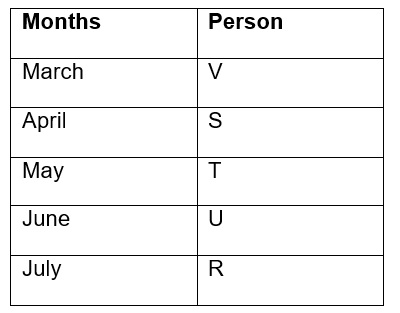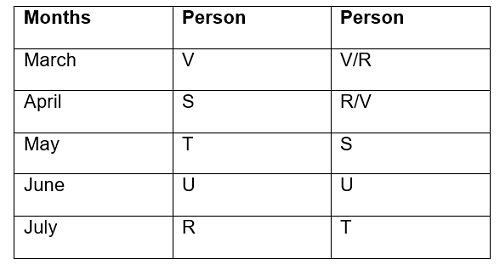Question
Five persons R, S, T, U, and V have seminar on 1st day
of five different months i.e., March, April, May, June, and July of year 2021 but not necessarily in the same order. Who has seminar immediately after V? Statement I: S has seminar in a month, which has only 30 days. Two persons have seminar between S and R. T has seminar before U. Neither T nor R has seminar in March. Statement II: U has seminar in June. S has seminar before T and after V. R doesn’t have seminar in May. The question given below consists of two statements numbered I, and II given below it. You have to decide whether the data provided in the statements are sufficient to answer the question. Read all the statement and answer the question.Solution
From Statement I alone: S has seminar in a month, which has only 30 days. Two persons have seminar between S and R. T has seminar before U. Neither T nor R has seminar in March, we get:  S has seminar immediately after V. From Statement II alone: U has seminar in June. S has seminar before T and after V. R doesn’t have seminar in May, we get:
S has seminar immediately after V. From Statement II alone: U has seminar in June. S has seminar before T and after V. R doesn’t have seminar in May, we get:  Either S or R has seminar immediately after V. Data given in statement I alone is sufficient to answer the question.
Either S or R has seminar immediately after V. Data given in statement I alone is sufficient to answer the question.
- Which military aircraft was part of India-U.S. defence discussions for potential purchase?
Where will the ₹150 crore facility for manufacturing Hansa-3 aircraft be located?
Who will conduct the 5G Hackathon VIMARSH 2023 to address the challenges faced by Law Enforcement Agencies?
On which date was India’s first all-women Clean Street Food Hub inaugurated by FSSAI?
How many UPI transactions in volume were recorded in India for the first time in a month i.e. August 2023, according to data released by the National Pa...
National Skill Development Corporation (NSDC) has partnered with ________ under the Skill India Mission to support self-employment and augment entrepren...
Comptroller and Auditor General of India (CAG) has been selected as external auditor of the International Labour Organization (ILO), Geneva for the term...
Which group is participating for the first time in the National Agriculture Conference – Rabi Abhiyan 2025?
The Invest Rajasthan Summit,2022 which was supposed to be held on 24th and 25th January, 2022 in Jaipur was postponed due to emerging cases of Covid 19,...
What was the main factor contributing to the moderation in bank credit growth to 13.9% in June 2024?
Relevant for Exams:



